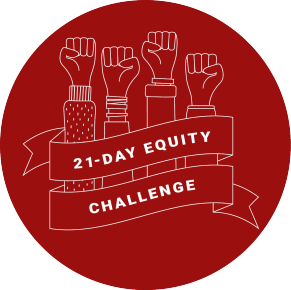The 21-Day Equity Challenge at Emma Willard School
2/9/2021
Sandra Santana
Last month, Eddie Moore, Jr., PhD brought a spark of inspiration to Emma Willard School with his virtual keynote, “Why Keep Dreaming,” honoring the life of MLK and the ongoing battle for social change. Over the next three weeks, our internal community practiced effective social justice habits by participating in Dr. Moore’s 21-Day Equity Challenge.
Change rarely happens overnight. Research suggests that it takes an individual approximately 21 days to make, or break, a habit. In pursuit of helping others fight for systemic change, Dr. Eddie Moore, Jr., Dr. Marguerite Penick-Parks, and Debby Irving used this habit-building formula to create the 21-Day Racial Equity Challenge. Dr. Penick-Parks defines the 21-Day Challenge as, “... an opportunity to engage in growth in racial awareness, issues of social justice, power, privilege and systemic inequities.” In an effort to take a wider-lens view at structural inequality, Emma Willard school embarked on a similar journey to examine foundational information about how and why these structures exist and are perpetuated.
For 21 consecutive days, Interim Assistant Director of Diversity, Equity, and Inclusion Gemma Halfi led the Emma community through a curated list of activities designed to deepen our understanding of the intersections of race, power, privilege, supremacy, and oppression. Each assignment typically required 15-30 minutes to complete and included numerous resources such as readings, videos, and podcasts. The content was intentionally selected to expose participants to perspectives and aspects of structural inequality and the way that inequitable systems are perpetuated in the US. Dissecting the Basic Principles of Equity Literacy, exploring intersectionality with Kimberlé Crenshaw, and observing data about wealth inequality in the US are just a few examples of the areas covered in the challenge.
The goal of the 21-Day Equity Challenge is to assist one another in becoming more aware, compassionate, constructive, engaged people in the quest for equity. We created a digital space for our community to share learnings, encourage deeper conversation, and give meaningful feedback regarding our work. Zoom check-in’s provided another facet of connection during the 21 days, nurturing more intimate and private conversation. Community members shared some of their reflections on the experience:
“The 21-Day Equity Challenge provided in-depth, meaningful resources for me to explore different aspects of my identity and the ways in which my privileges affect my everyday life. After reading through the articles and resources, I appreciated the dialogue facilitated by the google spreadsheet, where everyone shared their thoughts and comments about the material.” - Gabriela Z. '22
“I found the challenge really enlightening and productive even as it was, indeed, challenging. Even when I hit on a topic I thought I knew well, engaging with it in a deliberate and reflective way tended to push my thinking further and to make me keenly aware of where I have the most learning to do.” - Esther Dettmar, PhD English Instructor
“I'm glad I got to participate in the 21-Day Equity Challenge because I got the opportunity to learn new terms and concepts related to inequality that helped me process and understand experiences I've had where I was unconsciously making it acceptable for people to approach and treat me differently because of my race. I also learned that people don't often talk about certain social injustices because they don't see it explicitly happening, but we need to change that kind of mindset into understanding that social injustices are not always explicit and that it's not ok to dismiss someone's experiences just because you can't see it happening.” - Angelina T. '22
While the 21-Day Equity Challenge was open to all students, faculty, and staff, from January 19 to February 8, participation was completely voluntary. Participants were free to opt into the Google community accountability sheet along the way, and tracking personal progress was optional. Community members have access to the daily assignments through the end of the school year, should they choose to revisit or restart any of the challenges.
We look to the 21-Day Equity Challenge as an introduction to deep and connected learning about ourselves, our community, and our world. We are grateful to Dr. Eddie Moore, Jr. for sharing the 21-Day Equity Challenge with Emma Willard School and encouraging action for racial equity.

21-Day Equity Challenge














